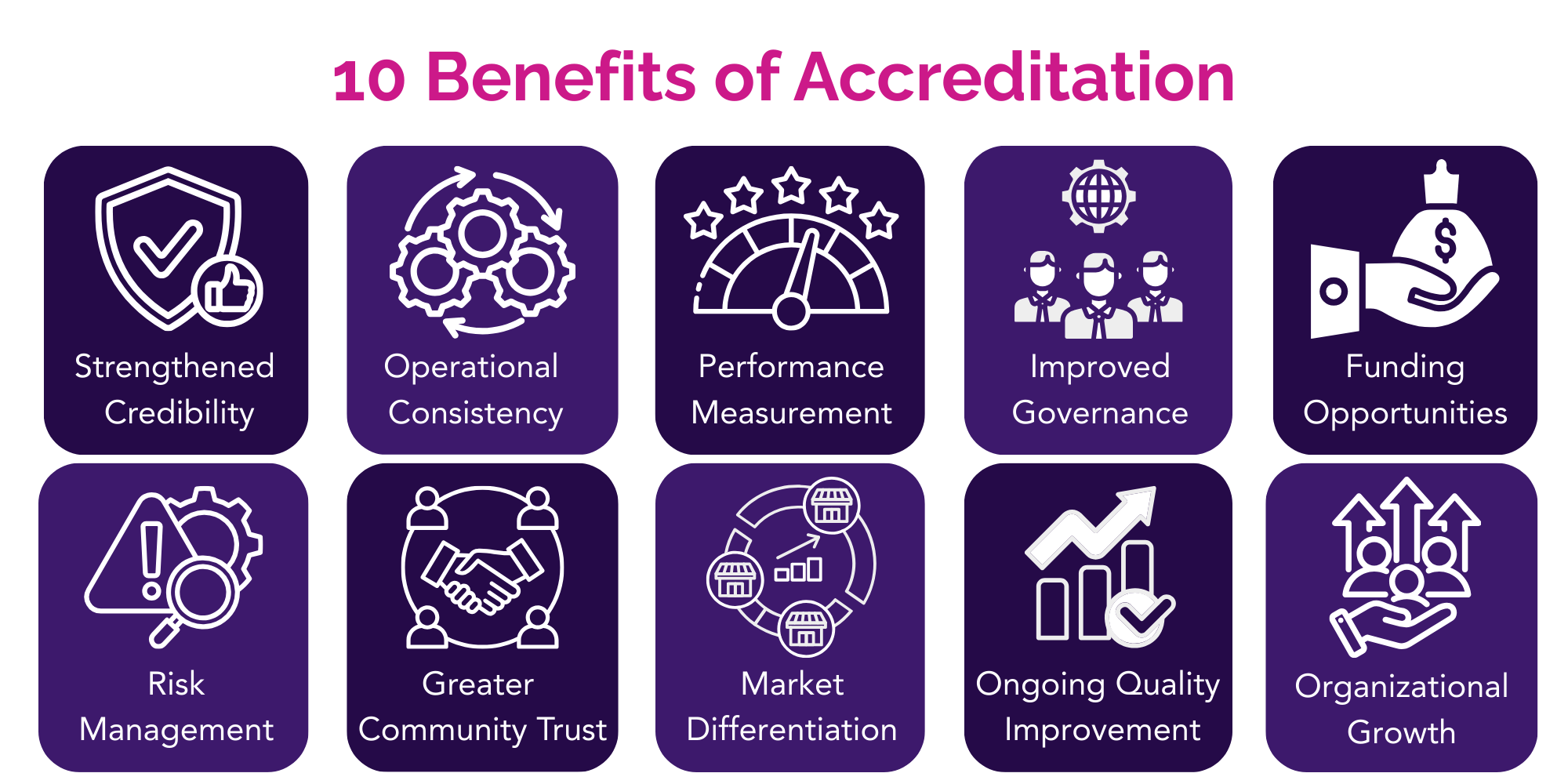10 Reasons to Get Accredited
There’s a quiet power in taking a close look at how an organization works – not from the surface but deep within, where decisions are made, where staff collaborate, and where the mission lives in everyday practice.
That’s the work of accreditation. It’s not about earning a plaque or chasing a label; it’s about aligning what you say you do with what actually happens. And in the process, your organization becomes stronger, steadier, and more capable of serving others.
Here are ten compelling reasons pursuing accreditation is worth every effort.
1. Strengthened Organizational Credibility
In a world crowded with mission statements, promises, and marketing messages, accreditation is proof. It shows that your work has been examined by professionals outside your walls and found to meet recognized standards. For funders, regulators, and clients, that external validation carries weight. But for your team, it’s a reminder: your work holds up to scrutiny.
2. Improved Operational Consistency
Accreditation isn’t comfortable, and that’s the point. The process pushes organizations to ask, Is this policy still serving us? Does our structure support our mission? It exposes the gaps between intention and practice. Many leaders describe accreditation as the first time in years they’ve had to pause, assess, and make deliberate improvements instead of reacting to problems.
3. Stronger Governance and Leadership
Strong governance doesn’t happen on its own. Through accreditation, boards and executives examine how authority flows, how data informs decisions, and how accountability is shared. Those conversations can be uncomfortable, but they result in leadership and a team that operates with structure, not instinct.
4. Enhanced Staff Engagement
Every staff member wants to know their work matters. Accreditation creates those connections in real, visible ways. Job descriptions align with outcomes. Training supports clear goals. People understand why procedures exist instead of seeing them as just rules to follow. The outcome is a team that moves in the same direction instead of just complying for compliance’s sake.
5. Increased Funding Opportunities
When an RFP asks for accreditation, that’s a signal. Funders want partners they can rely on, such as organizations that have proven systems and documented results. Accreditation gives you that competitive edge. It shows you’ve built a structure that can manage growth and deliver consistent outcomes, even under pressure.
6. Clearer Risk Management
Every organization faces risk — financial, legal, reputational. Accreditation doesn’t eliminate risk, but it gives you the tools to manage it. From clear incident reporting to up-to-date policies, the process helps identify weak spots before they become liabilities. The result is a more stable organization that can focus on mission, not crisis management.
7. Greater Community Trust
Communities can tell when an organization operates with integrity. Accreditation amplifies that trust by showing your willingness to be reviewed, measured, and held accountable. It tells your clients and partners: we invite oversight because we have nothing to hide.
8. Better Data and Performance Measurement
Too many organizations collect data they never use. Accreditation turns data into direction. It requires measurable outcomes, analysis, and adjustments based on evidence, not assumptions. Over time, this becomes part of the culture – decisions rooted in what’s real, not what’s merely comfortable.
9. Continuous Quality Improvement
Accreditation doesn’t end when the site visit is over. The standards are still there, asking for updates, evaluation, and continuous improvement. Organizations that embrace this rhythm become more adaptable. They notice problems earlier, celebrate progress more intentionally, and evolve with less disruption.
10. Organizational Growth and Sustainability
Growth doesn’t always mean expansion; sometimes it means deepening your impact. Accreditation gives leaders the structure and confidence to pursue both. With organized systems, aligned leadership, and measurable performance, your organization is equipped to adapt and grow with intention. Whether you’re scaling services or strengthening existing programs, accreditation provides the framework to manage complexity before it arrives—and the foundation to sustain excellence over time.
The Bigger Picture
Accreditation is often viewed as a requirement. In reality, it’s a mirror that reflects how an organization truly functions. What you see might surprise you, but if you lean into that reflection, what emerges is stronger, clearer, and better prepared to serve its mission.
The process takes time, effort, and humility. It asks for candor. But the payoff is lasting: credibility that’s earned, systems that work, and a culture built on integrity rather than assumption. When that happens, accreditation becomes part of who your organization is.
At Accreditation Guru, we help organizations prepare for greatness by making accreditation not just an achievement—but a transformation. Contact us today and take the first step!


